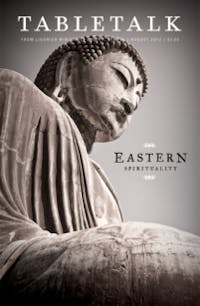
Request your free, three-month trial to Tabletalk magazine. You’ll receive the print issue monthly and gain immediate digital access to decades of archives. This trial is risk-free. No credit card required.
Try Tabletalk NowAlready receive Tabletalk magazine every month?
Verify your email address to gain unlimited access.
The early church faced at least two distinct and competing enemies. While Jesus walked the earth and after, the great challenge to the kingdom of God was found both in the Roman Empire and in Judaism. An armed force that was, though given to emperor worship, essentially secular and a false religion put their differences aside to eradicate a faith built around a King who had been given all authority in heaven and on earth.
I was reminded of this odd juxtaposition several years ago when I had the opportunity to travel to Burma to teach and train a group of godly pastors and elders who ended up teaching me. Burma is a country that is also in the grip of two great enemies of the reign of Jesus Christ, two fearsome institutions that will not kiss the Son (Ps. 2). Most people know that Burma is a military dictatorship. A military junta has ruled there for decades. That concept, of course, we’re used to. Though Burma is far less famous, we are familiar with North Korea, with Cuba, with China. What is odd is that Burma not only suffers from a military dictatorship, it suffers from a prevalent, widespread false religion. Burma is ninety percent Buddhist.
Now it is one thing for a brutal secular state to coexist with a dominant religion. It is another thing altogether for a brutal secular state to coexist with a religion that is purported to embrace all the broadmindedness and gentleness of spirit that we associate with Buddhism. We are, of course, accustomed to being fearful of militant Islam. We are aware of the ugly brutality associated with the animist religions in the darker corners of Africa. We are, if we are educated in the least, cognizant of the bloodthirsty gods associated with Hinduism. But Buddhists? Aren’t they a rather passive and gentle lot?
Some, indeed, might be tempted to think that the coexistence of a brutal police state and a “peaceful” religion makes perfect sense. The military suppresses the people, and the people turn to Buddhism as a way to cope with the hardship. They bear the brunt of brutality by longing to be absorbed into the One.
Such a perspective misses the point on at least two counts. First, it is a common but fundamental mistake to put the exercise of authority on the evil side of a spectrum and quietness on the good side of the same spectrum. Passiveness is not next to godliness, however, precisely because brutality does exist. When someone is beating my child, I do not calm my soul by closing my eyes, adopting the lotus position, and chanting my mantra. Love means protecting my children, actively defending them. It means not turning my back on authority but exercising my God-given authority to defend what He has placed under my care. The state is as brutal as it is in Burma in part because the false Eastern religion practiced there allows it to be.
It is not, of course, just Burma. The same passiveness of Buddhism contributes to the great shame of neighboring Thailand. There, prostitution is a way of life, Thailand itself having become a destination spot for sexual adventurers.
The second mistake is to misunderstand the nature of the state and religion. When Henry Van Til described culture as religion externalized, he wasn’t just talking about Christian cultures. A close look at any culture will reveal the underlying religion. The dictatorship of Burma isn’t something in contrast to the Buddhism of that nation, but it is the result of that Buddhism. A people whose goal is to be absorbed will tend toward a state that is happy to comply with their wishes. They will be absorbed into the collective. The Buddhists of Burma are not some poor, misunderstood victim group of the junta. They are the parents of the junta.
As sorrowful a nation as Burma is, however, Jesus is at work there. I met faithful, godly saints there who are seeking first the kingdom of God and His righteousness. My friend Naing leads a group of three hundred pastors all across the country who bring the gospel to the lost. He runs an orphanage out of his home, a mishmash of corrugated metal and dirt floors.
Naing, in proclaiming Christ and Him crucified, is speaking to both of the great evils in His land. He reminds the Buddhists that the goal is not that we would all be absorbed, but that we would be remade. The world is no illusion, but it is instead groaning under our sin, as it, too, is being redeemed by our Lord. He reminds the military rulers that Jesus Christ is Lord, that He reigns, and that all those who refuse to kiss Him will be dashed to pieces like a potter’s vessel (Ps. 2).
Naing does this in his land even as we are called to do it in our own. He speaks the Word into the world, and He feeds the sheep with the same Word. He lives a life of service and example, a life of joy grounded in the risen and reigning Lord Jesus. I went there to teach him. Instead, he taught me.
